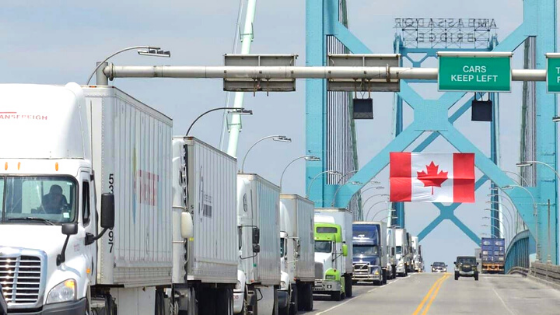Coronavirus Update: How Border Crossings Changed for Inland Freight

Read Time: 4 minutes
The inland freight industry has seen more than its fair share of challenges over the last several years. Now the industry is facing the problem of disruptions related to the Coronavirus.
Border crossings have drastically changed since the outbreak of the virus. United States border crossings on the Canadian and Mexican borders have been closed to non-essential travel to help prevent the spread of the virus.
Commercial vehicles, which are considered essential, are still permitted to cross back and forth between countries to keep trade going during this challenging economic period. However, North American truckers headed to borders are finding tighter restrictions, delays, and frequent disruptions.
Closing Leads to Delays and Disruptions in Nogales
One example of the difficulties that inland freight is facing is the additional closures of some parts of ports of entry. More than 2,000 trucks per day cross the Nogales border that connects Nogales, Arizona to Nogales, Sonora in Mexico. Nogales is one of the busiest borders between the United States and Mexico. Many of the trucks passing through carry fresh fruit and vegetables headed to overwhelmed supermarkets throughout the United States.
Toward the end of March, the Servicio de Administracion Tributaria (SAT), which is the Mexican equivalent of the U.S. Customs and Border Protection agency, announced it would be shutting down its Morley pedestrian crossing. Soon after that announcement, they also decided to shut down operations on Sundays for the crossing's cargo processing facility.
Delays are expected as border guards continue to uphold travel restrictions at the border. This process could disrupt both shippers and carriers when setbacks occur, mainly because of the time-sensitivity of transporting perishable cargo.
Canadian Border Crossings Open for Commercial Travel
Under normal circumstances, more than 200,000 people a day cross into Canada from the United States. However, for the time being, border crossings between Canada and the United States will remain open to only commercial traffic.
This exception is to continue linking the two countries' highly-integrated supply chains. Truckers from both sides are bringing lifesaving medicines, food, fuel, and other essential goods and materials to the two countries.
Many Canadian truckers face having to be in self-quarantine upon re-entering Canada. This fact has forced many to make the difficult choice of staying away from their families to protect them from possible exposure.
At the beginning of the Coronavirus crisis, it was uncertain if Canadian truckers would be covered for emergency out-of-the-country medical expenses if they were to fall ill while in the United States. This question has since been resolved as truckers have been assured they would be covered.
Importance of Keeping Trade Border Crossings Open
North American leaders know the importance of keeping border crossings open to keep trade going. More than $1.4 billion in truck and rail freight goes over the U.S. – Mexico border daily. In 2019, exports totaled $358 million, making Mexico the United States' second top trade partner.
Almost $1.5 billion in merchandise trade goes across the United States – Canada borders each day, making Canada the top trade partner of the United States.
Shippers rely on carriers and their truckers to get the job done. Now, more than ever, shipments must get through, especially those that are intended to fill empty grocery shelves. Keeping trade flowing is vital to maintaining the economy through the Coronavirus crisis.
Stay Tuned to Cargobot for More Coronavirus Updates
It is a crazy time for both shippers and carriers in the domestic freight industry because of the Coronavirus. Cargobot can help. We connect shippers with carriers and help you take control of your futures.
With our app, you always know where your cargo is. Subscribe to our blog to stay up to date on the latest tech advancements in inland freight.

